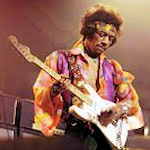
Jimi Hendrix, born Johnny Allen Hendrix on November 27, 1942, and later renamed James Marshall Hendrix, was an American guitarist, singer, and songwriter. He is widely regarded as one of the most influential and iconic musicians in the history of rock music. Hendrix's innovative approach to guitar playing, combined with his experimental sound and charismatic stage presence, revolutionized the genre and established him as a true legend.
Early Life and Career:
Hendrix was born in Seattle, Washington. He developed an interest in music at a young age, inspired by blues, R&B, and rock and roll artists like B.B. King, Muddy Waters, Elvis Presley, and Chuck Berry. He received his first guitar at the age of 15 and quickly mastered the instrument, playing in various local bands.
In 1961, Hendrix enlisted in the United States Army but was honorably discharged in 1962 due to an injury. He then began his professional music career, playing in backup bands for artists such as Little Richard, the Isley Brothers, and Curtis Knight.
Breakthrough and Formation of the Jimi Hendrix Experience:
Hendrix moved to London in 1966, where he formed the Jimi Hendrix Experience with bassist Noel Redding and drummer Mitch Mitchell. It was in London that Hendrix gained widespread attention and acclaim for his extraordinary guitar skills and unique sound.
The band released their debut album, "Are You Experienced," in 1967, which showcased Hendrix's virtuosic playing, creative songwriting, and innovative use of guitar effects and techniques. The album included hits like "Purple Haze," "Hey Joe," and "The Wind Cries Mary," and it firmly established Hendrix as a rising star in the music world.
Musical Style and Technique:
Hendrix's guitar playing was characterized by his mastery of the electric guitar and his ability to push its sonic boundaries. He combined elements of blues, rock, funk, and psychedelia, creating a distinct and revolutionary sound. Hendrix pioneered the use of feedback, distortion, and controlled noise, expanding the possibilities of the electric guitar as an expressive instrument.
His guitar solos were marked by their fiery intensity, intricate phrasing, and melodic sensibility. Hendrix was known for his improvisational skills, often incorporating extended jams and improvisations into his live performances. His use of innovative techniques, such as playing with his teeth or behind his back, added to his stage persona and made him a captivating performer.
Legacy and Influence:
Jimi Hendrix's impact on popular music cannot be overstated. His short but prolific career left an indelible mark on rock, and his influence continues to be felt today. He inspired countless guitarists and musicians, from his contemporaries to future generations.
Hendrix's influence can be heard in the work of artists like Eric Clapton, Stevie Ray Vaughan, Eddie Van Halen, Prince, and many others. His music transcended genres and cultural boundaries, making him a cultural icon and a symbol of the counterculture movement of the 1960s.
Tragically, Hendrix's career was cut short when he died on September 18, 1970, at the age of 27 due to an accidental overdose of sleeping pills. However, his music and legacy continue to resonate, and he is remembered as one of the greatest guitarists and performers of all time.
Hendrix's discography includes several influential albums, such as "Axis: Bold as Love" (1967) and "Electric Ladyland" (1968), both recorded with the Jimi Hendrix Experience. Additionally, posthumous albums featuring unreleased material have been released over the years, further cementing his status as a legendary figure in music history.
